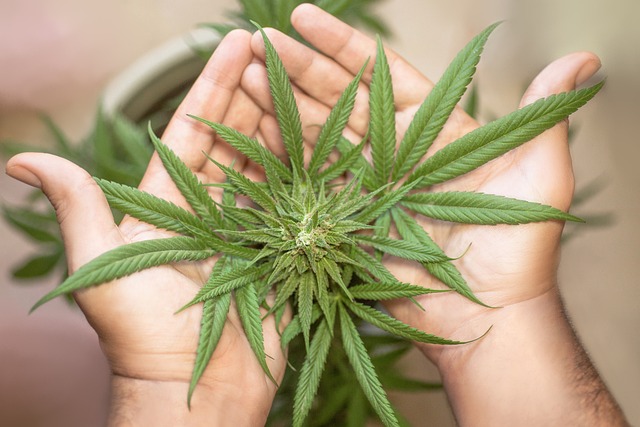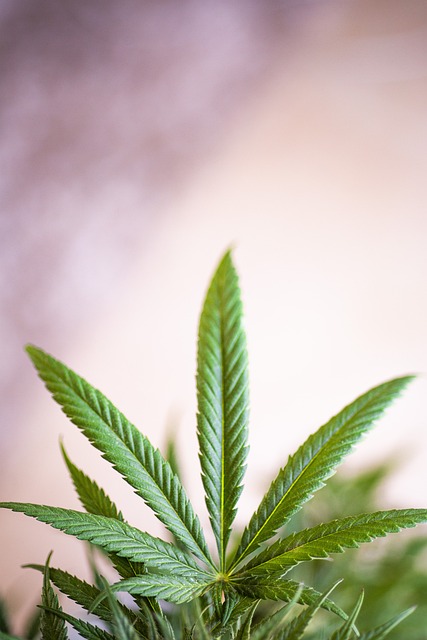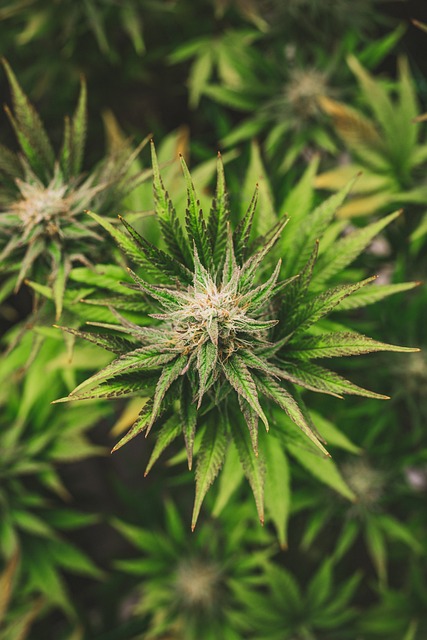2023 has seen a surge in interest for THCA (Tetrahydrocannabinolic Acid), a non-psychoactive compound from cannabis and hemp that's legal in Delaware under the state's regulations following the 2018 Farm Bill. THCA is gaining recognition for its potential therapeutic benefits, such as pain relief, anti-inflammatory properties, and neuroprotection, which are particularly appealing to those seeking wellness effects without cognitive impairment. Unlike Delta-9 THC, THCA primarily engages with CB2 receptors, potentially offering a different profile of effects with reduced side effects like anxiety and paranoia. The recent focus on THCA in Delaware reflects a broader shift within the cannabis industry towards exploring less psychoactive alternatives for health and wellness. As legalization varies across states, consumers in Delaware now have access to products containing THCA, which is being studied for its unique interaction with the endocannabinoid system. It's crucial for users to be informed about proper dosing, consumption methods, and how their bodies may respond to THCA as more states consider its inclusion in legal cannabis offerings. For those interested in the benefits of THCA, Delaware serves as a pioneering state in its availability, with a growing market that emphasizes transparency and reliability in product labeling and sourcing.
Exploring the intricate world of cannabinoids, this article delves into the therapeutic and potential benefits of THCA flower, a raw cannabis form that’s gaining attention for its unique properties. We will dissect its chemical composition, compare it to Delta-9 THC, and discuss how Delaware’s legal landscape regards THCA. Understanding how to responsibly and safely consume THCA flower is paramount, as well as appreciating the entourage effect of terpenes and other cannabinoids. Aspiring cultivators in Delaware will find insights on growing high-quality THCA flower. We’ll also examine the medical benefits of THCA, its role within Delaware’s cannabis program, and offer guidance for first-time users navigating THCA products. The article will cover the decarboxylation process impacting THC content, the implications of state and federal laws on its legal status, and what users can expect in terms of dosing and effects. This comprehensive guide aims to shed light on the burgeoning interest in THCA flower, particularly as it stands within Delaware’s evolving cannabis regulations.
- THCA Flower: Unveiling the Potential of Raw Cannabis
- The Chemical Composition of THCA and Its Implications for Users
- THCA vs. Delta-9 THC: Understanding the Differences
THCA Flower: Unveiling the Potential of Raw Cannabis

Discovering the myriad potentials of THCA flower opens a new chapter in the world of cannabis consumption. Tetrahydrocannabinolic acid (THCA) is the non-psychoactive precursor to THC, the primary psychoactive component found in cannabis. As legal frameworks evolve, such as the legislation allowing THCA legal in Delaware, enthusiasts and researchers alike are delving into the raw form of the plant to uncover its therapeutic properties. THCA is gaining attention for its anti-inflammatory and neuroprotective effects, which may offer relief from various ailments without the psychoactive ‘high’ associated with THC. The interest in THCA flower stems from its potential to be utilized in a variety of ways, including infusions, topicals, and smokable preparations. As regulations continue to shift, allowing for more experimentation and exploration, the cannabis community is eager to explore the full spectrum of benefits that THCA has to offer, contributing to a burgeoning market for raw cannabis products. The unique characteristics of THCA flower make it an intriguing subject for both scientific study and personal exploration, with its legal status in certain states like Delaware paving the way for these discoveries.
The Chemical Composition of THCA and Its Implications for Users

Delta-9-tetrahydrocannabinolic acid (THCA) is the non-psychoactive precursor to the well-known psychoactive cannabinoid THC. Found abundantly in raw cannabis plants, THCA has garnered attention for its potential therapeutic benefits, which are being explored as legal landscapes evolve, such as in states like Delaware where THCA is included in legal cannabis products. The chemical structure of THCA includes a cyclohexene ring that must be decarboxylated to form the psychoactive THC upon heating or exposure to light. This unique composition contributes to THCA’s potential efficacy in managing pain, nausea, and inflammation without the high associated with its active form. The presence of this cannabinoid in legal cannabis products available in Delaware offers users a range of options tailored to their wellness needs, highlighting the importance of understanding the distinct properties of different cannabinoids as research continues to unfold.
In addition to its therapeutic potential, THCA interacts with the body’s endocannabinoid system through its affinity for both CB1 and CB2 receptors, albeit less strongly than THC or CBD. This interaction may influence a variety of physiological processes, including mood regulation, appetite control, and immune response modulation. The legal status of THCA-containing products varies by state, with Delaware being one of the states where such products are permitted under certain conditions. As users explore the implications of THCA’s chemical composition, it is crucial to consider the dosage, method of consumption, and individual body chemistry to maximize the intended effects and ensure a safe experience. The evolving legal framework around cannabis and its derivatives, including THCA, underscores the importance of staying informed about state-specific regulations. Users in Delaware interested in the benefits of THCA should seek products that are clearly labeled and sourced from reputable providers to navigate this emerging market with confidence.
THCA vs. Delta-9 THC: Understanding the Differences

THCA, or Tetrahydrocannabinolic Acid, is a naturally occurring compound found in the Cannabis sativa plant that has garnered attention for its potential therapeutic benefits. Unlike its well-known isomer Delta-9 THC, which is responsible for the ‘high’ associated with cannabis use, THCA exists in its non-psychoactive acid form until it is exposed to heat or light, at which point it can degrade into Delta-9 THC. The legality of THCA-rich products varies across jurisdictions within the United States, and as of the knowledge cutoff in 2023, THCA is legal in Delaware when derived from hemp compliant with the 2018 Farm Bill, provided it contains less than 0.3% Delta-9 THC on a dry weight basis.
Research suggests that THCA may offer analgesic, anti-inflammatory, and neuroprotective properties without the psychoactive effects of Delta-9 THC. This distinction is significant for individuals seeking the therapeutic benefits of cannabinoids without the mind-altering experiences typically associated with cannabis consumption. In contrast to Delta-9 THC, which binds primarily to the CB1 receptors in the brain, THCA is believed to interact more with CB2 receptors found throughout the body’s immune system, offering a different profile of effects. This differential interaction may explain why some users report less anxiety and paranoia with THCA than with Delta-9 THC. As such, understanding the differences between these two compounds is crucial for consumers and healthcare providers alike, especially in contexts where cannabis legislation is evolving, as seen in the state of Delaware.
The exploration into the THCA flower has shed light on its unique potential within the realm of cannabinoid consumption, particularly as it pertains to the legal landscape in states like Delaware. The chemical properties of THCA offer a distinct experience compared to its psychoactive counterpart, Delta-9 THC, providing insights that could shape future cannabis use and research. As laws evolve and regulations clarify, the significance of THCA-rich flowers as a legal alternative for users seeking therapeutic benefits or a non-intoxicating experience becomes increasingly apparent. This comprehensive analysis underscores the importance of further study into the full spectrum of cannabinoids, ensuring that consumers and policymakers have a clear understanding of the options available to them within the legal framework.
